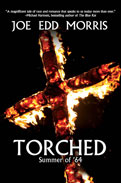
 |
Sensitive, idealistic Sam Ransom probably doesn't intend to live up to his last name, but he chooses a profession wherein he does exactly that—saves, that is, ransoms lost souls. When Sam is nine in segregated 1950s Mississippi, a black lay preacher named Giles Word draws him gently away from a life of racial prejudice and ignorance. This leads to other interracial friendships. First is Early Holly, named so because of his premature birth, who is then severely burned in a house fire that kills his father. Giles' niece Sharon Rose comes next, capturing both Sam's imagination and his heart. Not caring what their neighbors think, the three form an innocent childhood friendship. Adolescence brings awareness of racial tensions, and in time they grow apart.
But the 1960s bring widespread social consciousness and find Sam in divinity school and Early and Sharon Rose participating in the civil rights movement. In the summer of 1964, Sam embarks on a hectic summer seminary internship in Holmes County, Mississippi. He is responsible for eleven congregations. The parishioners of Bethel and Mount Holy Rest Churches are not among them. Bethel, a black Methodist church, has burned to the ground at the hands of the Ku Klux Klan. Mount Holy Rest, a church of the same denomination, serves as a meeting place for civil rights volunteers. There, Sam joyously reconnects with his childhood friends. Yet within the movement, there are violent and peaceful factions. And even amid an old friendship, there exist jealousies, resentments, and unrequited love.
Meanwhile, Sam gives in to carnal desire, a transgression that leaves him feeling unworthy to enter the ministry. After Klansmen murder Early, Sam kills one of them. But was it for revenge or to protect Sharon Rose from rape? Only a confession to a dying man forty years later will ease his mind on that point. Nor, it turns out, is Sam the only one with a shocking secret. Some people call the summer of 1964 the summer that didn't end. That phrase accurately describes Sam's subsequent life in ways he only begins to understand decades later.
Like his protagonist, Morris is a minister, born in New Albany, Mississippi. He is also a practicing psychologist. Both circumstances enable him to write with poignant nostalgia for the high ambition and focus that characterized the civil rights movement's early days. He offers the unique perspective of a white civil rights movement volunteer in the character of Sam Ransom. As he attends meetings, helps rebuild a burned-out church, and witnesses the beginning of a friend's lynching, Sam has many opportunities to humbly learn from those whose cause he helps to support.
Readers may well take Sam's enthusiastic participation and embrace of danger as signs that he never loses faith in the original purpose of the movement. Sam's constant desire to heroically save Sharon Rose during childhood games symbolizes unconditional loyalty, friendship, and a romantic love that knows no color barrier. His later sexual attraction to her and his willingness to make any sacrifice to be with her show his constancy. The realization occurs late, but Sam eventually concedes that Early is right when he says that, for all Sam's bravery and good intentions, the struggle for equality is not his fight.
However, the existence of Rand—Sam and Sharon Rose's biracial love child—would seem to suggest that such a fight is, in fact, a joint effort between races, though to what degree might be for each individual to decide. Certainly, the quiet conviction of Sharon Rose's nonviolent stance might seem to yield the most positive results if one considers her continued life at the end of the novel the best outcome. Early dies as violently and angrily as he lived. However, Sharon Rose avoids rape with peaceful dignity. The author reveals that Southern white men of conscience, though seemingly not the norm, did exist and support African American civil rights activists in this era. Present-day Southerners of any gender who fit that description may find this book of interest, as might members of the clergy and people of color.
Honorable Mention in the 2021 Eric Hoffer Book Award Mystery/Crime Category, as well as a Montaigne Medal Finalist